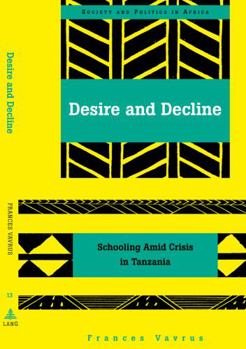Desire and Decline: Schooling Amid Crisis in Tanzania (Society and Politics in Africa, Volume 13)
Select Format
Select Condition 
Book Overview
Desire and Decline explores the privileged place of education in local, national, and global development discourses about population, HIV/AIDS, and environmental conservation. Desire signals the global consensus on the view that education is central to solving problems of development. Decline , on the other hand, draws attention to the growing gap between those who have access to basic social services - such as education - and those who do not. Based on multiple periods of fieldwork on Mount Kilimanjaro, Frances Vavrus links local and global narratives about the potential of education to enhance development but also reveals its limitations in postcolonial countries experiencing the pressures of globalization. Vavrus concludes with portraits of local development initiatives that leave readers with a clear sense of the complexity of education's role in development, and the importance of political economic analysis for global population, health, and environmental policy.
Format:Paperback
Language:English
ISBN:0820463116
ISBN13:9780820463117
Release Date:October 2003
Publisher:Peter Lang Inc., International Academic Publi
Length:170 Pages
Weight:0.60 lbs.
Dimensions:0.4" x 7.0" x 10.0"
Customer Reviews
1 rating
ethnographically rich critique of "education as panacea"
Published by Thriftbooks.com User , 17 years ago
In this book, Frances Vavrus takes on a range of interlocking issues in a broad sweep that is too rare in studies of education in Africa. In doing so, she illustrates the complex interplay of poverty, schooling, gender relations, natural resource struggles, and AIDS in the context of postcolonialism and economic decline. Her study is located among Chagga people on the southern slopes of Mount Kilimanjaro in Tanzania. Historically, this area has had relatively high levels of formal education primarily because of the vagaries of colonial policy. Yet, today, in the context of economic decline, education holds little actual promise of future paid employment. Why then, she asks, does faith in education persist? Her goal is to "examine the conditions that give rise to the desire for schooling ... and to the conditions that constrain the transformations that schooling can produce" (p. 4). This book contains a remarkable range of analytic levels and methods. Vavrus takes us on a whirlwind tour of development theory and practice and grounds us in the history of the region. She returns again and again to one of the dominant themes of development discourse, "education as panacea," a phrase she uses to describe "the enduring faith that schooling will effect profound social change in the Third World, even in places where political-economic conditions make such transformations highly unlikely" (p. 7). She points out an enduring dichotomy in education policy in Africa, "culture as cause" of economic backwardness and "culture as cure" for development problems. But, importantly, going beyond discourse analysis, she shows how "education as panacea" acquires meaning at the local level. Vavrus begins by discussing the role of the "feminist modern" as a further entrenchment of the education as panacea idea, concluding that women's choices about childbearing, reproductive health, and environmental conservation are shaped by social and political-economic considerations that the independent figure of the feminist modern does not take into account. She claims that it is the desire for schooling--and not primarily the content of formal education--that is driving down the fertility rate in the Kilimanjaro Region and driving up the risk of HIV/AIDS among young women who cannot afford a postsecondary education. She is not the only scholar to point out the risk of sexually transmitted disease, especially HIV/AIDS, to young girls who turn to older men for assistance with school fees in return for sexual favors. However, her analysis of this issue is deeper than usual in its sensitivity to education and class and in its examination of young people's own feelings about the threat of AIDS. The students in one of her focus group discussions spoke about the common view that getting AIDS is, for them, like having a car accident: "It's common; it's painful; it can kill you outright, but no one is going to start walking to town, especially not secondary school graduates" (p. 106). S






